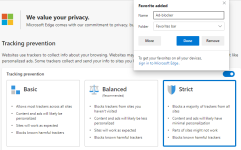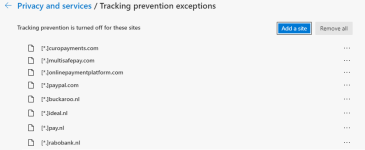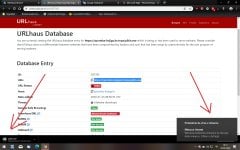- Oct 1, 2019
- 1,120
@oldschool Based on your positive feedback, my girlfriend is using the strict option of anti-tracking: thanks 
She noticed that she been googling for a weekend shopping with her two best friends in Sevilla and when she had found a (cheap) flight and a Little apartment, she informed her friends. So when her friends checked the flight and apartment (booking links) to confirm whether it was okay (location, distance to old-town etc), both (!) her friends got a better deal offered.
When my girlfriend checked after remarks of her friends, she again got a much higher deal (with only a few seats/last option warnings). I stopped her booking it and ask her to let one of her friends book the trip. Indeed they could book it cheaper. I explained her that she had been on the websites often, showing interest. Increasing prices is a well known mechanisms to lure people into buying impulsively.
I explained that this is how interest based advertising and pricing works (that is what I studied ), the higher the customer need (shown interest), the higher the price. She said "I don't want that". Then I explained her she had to learn something to lower the effect and I added the short cut below. Now she has learned herself:
), the higher the customer need (shown interest), the higher the price. She said "I don't want that". Then I explained her she had to learn something to lower the effect and I added the short cut below. Now she has learned herself:
1. When a website brakes or does not does what it should do, lower the privacy settings to balanced temporarily
(I have excluded Dutch payment services and our bank, see second picture)
2. Reset balanced to strict again after finishing transaction
Shopping as motivation to educate oneself on privacy, works perfect Until now she has not complained about the hassle (she only had one website which did not activate a coupon) in two weeks time, so it seems a promising approach (educating users)
Until now she has not complained about the hassle (she only had one website which did not activate a coupon) in two weeks time, so it seems a promising approach (educating users)


She noticed that she been googling for a weekend shopping with her two best friends in Sevilla and when she had found a (cheap) flight and a Little apartment, she informed her friends. So when her friends checked the flight and apartment (booking links) to confirm whether it was okay (location, distance to old-town etc), both (!) her friends got a better deal offered.
When my girlfriend checked after remarks of her friends, she again got a much higher deal (with only a few seats/last option warnings). I stopped her booking it and ask her to let one of her friends book the trip. Indeed they could book it cheaper. I explained her that she had been on the websites often, showing interest. Increasing prices is a well known mechanisms to lure people into buying impulsively.
I explained that this is how interest based advertising and pricing works (that is what I studied
1. When a website brakes or does not does what it should do, lower the privacy settings to balanced temporarily
(I have excluded Dutch payment services and our bank, see second picture)
2. Reset balanced to strict again after finishing transaction
Shopping as motivation to educate oneself on privacy, works perfect


Last edited:




